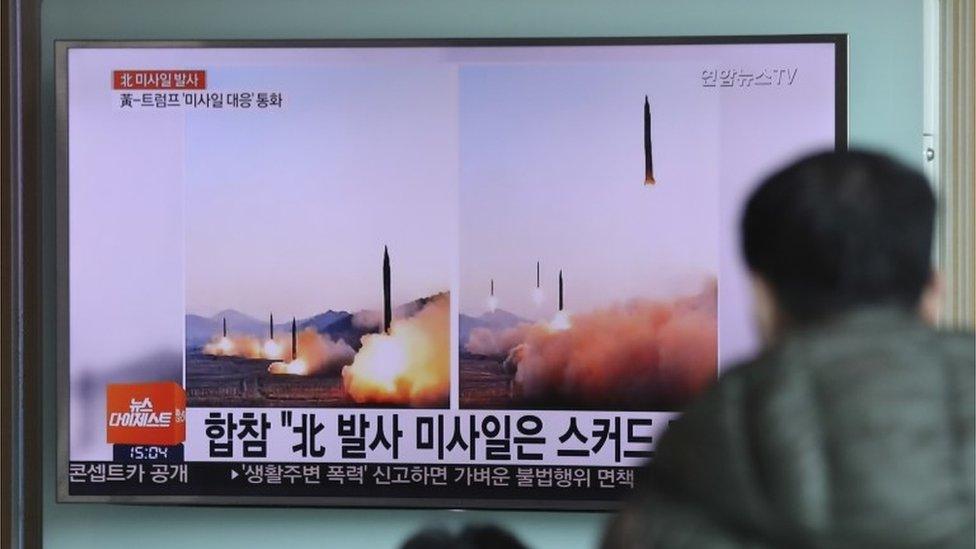US dismisses China proposal on N Korea military halt
- Published

US officials have dismissed China's suggestion that North Korea could halt its missile and nuclear test in exchange for a suspension of US military activity in the region.
The US state department said it was not "a viable deal" while the UN ambassador said North Korea was not "rational".
China's suggestion came after North Korea launched four ballistic missiles, breaking international sanctions.
Meanwhile the US has begun deploying a missile defence shield in South Korea.
It is also conducting its annual large-scale drills with the South Korean military, which routinely infuriate North Korea.
Chinese Foreign Minister Wang Yi said on Wednesday that the security situation on the Korean peninsula was like "two accelerating trains, coming toward each other with neither side willing to give way".
A mutual halt of military operations by all parties would be the first step towards easing tensions and reopening negotiations, he said.
US ambassador Nikki Haley said all options remained on the table in handling North Korea
But US state department spokesman Mark Toner said this was like comparing "apples and oranges".
"What we're doing in terms of our defence co-operation with South Korea is in no way comparable to the blatant disregard that North Korea has shown with respect to international law."
But he said the US needed to look for new strategies on North Korea.
"All of the efforts we have taken thus far to attempt to persuade North Korea to engage in meaningful negotiations have fallen short, to be honest," he said.
"So we need to look at new ways to convince them, to persuade them, that it's in their interests."
'Irresponsible arrogance'
The UN Security Council held an emergency meeting on Wednesday, having issued a stronger than usual condemnation of the latest North Korean test.
It accused North Korea of "increasingly destabilising behaviour" which risked sparking a regional arms race.
The US ambassador to the UN Nikki Haley later told reporters that "all options were on the table" regarding North Korea.
But she said that the world was "not dealing with a rational person" when it came to the North Korean leader.
"It is an unbelievable, irresponsible arrogance that we are seeing coming out of Kim Jong-un at this time," she said.
Ms Haley also repeated US assurances that the installation of the US-made Terminal High-Altitude Area Defense system (Thaad) in South - to shoot down missile attacks from the North - was not a threat to China.
China has been angered by the system, as it believes its powerful radar will enable the US to monitor its military activities too.
Ms Haley said the US was "not going to leave South Korea standing there with the threat of North Korea facing them and not help".
Japan and South Korea also rejected the idea of a deal with North Korea.
What is the Terminal High Altitude Area Defense System (Thaad)?
Shoots down short and medium-range ballistic missiles in the terminal phase of their flight
Uses hit-to-kill technology - where kinetic energy destroys the incoming warhead
Has a range of 200km and can reach an altitude of 150km
US has previously deployed it in Guam and Hawaii as a measure against potential attacks from North Korea
1. The enemy launches a missile
2. The Thaad radar system detects the launch, which is relayed to command and control
3. Thaad command and control instructs the launch of an interceptor missile
4. The interceptor missile is fired at the enemy projectile
5. The enemy projectile is destroyed in the terminal phase of flight
The launcher trucks can hold up to eight interceptor missiles.
- Published6 March 2017
- Published10 August 2017
- Published5 March 2016
- Published19 July 2023